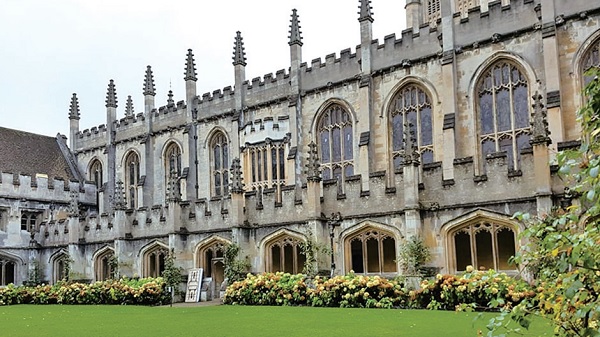Tracing the footsteps of a generation of Christian literary giants
Photo courtesy/Yin Liqun

After attending my daughter’s Oxford University graduation ceremony, the next morning it was clear and clear. I took a ride to the nearby town of Headington and walked through the green paths to the quaint and solemn Holy Trinity Church. The son is looking for a tombstone in the cemetery of Huantang.
The autumn wind blows and the sky is cool, blowing away the endless fallen leaves and dyeing the ground yellow. My daughter suggested: "It's a race to see who can find it first." Several people searched for traces in the garden, but they focused on the "monument" and searched for him hundreds of times without finding anything. I seemed impatient: "I'd better ask people."
"No, it's fun to find it yourself." The child insisted, and just "cheated" a bit. He searched the Internet for the appearance of the tombstone on his mobile phone and found that it was located next to a big tree. We walked along several trees in the cemetery and carefully observed the surroundings. After a while, we heard our daughter's scream: "Found it!" The flat marble tombstone was covered with moss, and the elegant white lamp illuminated the engraved cross.
I opened the leaves casually, and I could clearly see:
Clive Staples Lewis
BORN BELFAST 29TH NOVEMBER 1898
DIED IN THIS PARISH
22ND NOVEMBER 1963
Hidden away in a corner, devoted to loving God
After the monument hunting game was over, we moved into the church. Next to the seat where CS Lewis used to sit during his lifetime, there were two pure white glass windows with inscriptions related to The Chronicles of Narnia. ) related story scenes, photos and brief introduction of this Christian literary giant are placed in front of the window. It mentioned:"Every Sunday worship, he is like an invisible man. He comes to the church early, sits in the same inconspicuous corner, and leaves quietly before the service ends."
I sat in his hidden corner for a long time and realized that this man who is known as the most influential Christian in the 20th century "hides himself". He does not like to highlight himself and is not keen on social greetings. When he came to the church, he concentrated on getting close to the Triune God, and was satisfied after experiencing the joy of being with the Lord. This persistence and devotion to love the eternal God enabled him to be used by God and produce masterpieces of faith literature that have been handed down from generation to generation!
Step out of the church, cross the main road, walk into the quiet and peaceful village, and arrive at the former residence of Master Lu Yi called "The Kilns". This typical British-style red brick house is full of pastoral charm and rural romance. It reminds me of the words of the humorist Lin Yutang:"One of the 'ideal lives of world unity' is 'living in the UK'TownshipVillage house’. "It must be due to the ideal atmosphere. Master Lu Yi, who advocates tranquility and simplicity, has a calm and leisurely mood, and his writing inspiration flows like a spring. He loved the semi-secluded life in the kiln house so much that he came back every weekend during the ten years when he went to Cambridge to teach. Finally, he passed away here.
Narnia source of inspiration
Looking inside the house from the window, I saw an empty living room and study room, with neatly decorated furniture, elegant and unique. A gray-haired old man suddenly opened the door and politely introduced the guided tour time of the kiln house. We couldn't enter because we didn't make a reservation online, so he recommended a nearby green hidden lake, emphasizing that : "This is the birthplace of inspiration for "Narnia."" This suggestion aroused everyone's interest and they went there immediately.
Stepping through the muddy ground, what comes into view is a small forest hidden behind the kiln house, with a cave to the sky, and lush branches and leaves embracing the small lake. The ducks are splashing leisurely in the water, the sun is shining on the lake, and the golden spots are floating on the lake. They are jumping with the sound of gurgling water. It is a paradise!
Stopping for a moment, your body and mind are washed by the natural spiritual energy, filtering out the complicated thoughts, and inexplicable joy wells up in the depths. I can’t help but recall that Master Lu Yi mentioned that he had a mysterious sense of joy since childhood, which came from being close to nature, interacting with people, or reading. This indescribable joy captured him, but he searched for the source for many years but could not find it until he returned home. Believe in Christ. Therefore, I wrote my faith autobiography "How I Became a Christian" (Surprised by Joy) for this surprise.
The hidden Xiaolin Bell is so beautiful. It is no wonder that Master Lu Yi was so happy when he was in it that he suddenly burst out with imagination and created the world of "Narnia", unveiling a series of fresh and surprising adventures for the souls who were depressed and depressed after World War II. It uses fantasy fables as a metaphor for God's message of redeeming mankind, and uses extraordinary imagination to wash away the current social tragedy. "The Chronicles of Narnia" has really rekindled people's hopes after the war. Countless British people have a magic wardrobe in their childhood. They imagine that they go to the Kingdom of Narnia to meet the Lion King Asnen, and then fight against the evil White Witch together to witness "Light will eventually defeat darkness."
As they get older, everyone discovers that the battle in Narnia is not in the closet, but the battle between good and evil in everyone's heart, and "light will eventually defeat darkness", which will not be realized until Jesus returns. What is valuable is that Master Lu Yi has a pure and innocent heart, is close to the pulse of God, and uses transcendent creativity and childlike strokes to convey the ultimate love of Christ who laid down his life for sinners. This love contains the power of goodness and can lead all those who believe in it to return to the real ideal world of Narnia.

▲The kiln house, the former residence of Master Lu Yi, is located in the tranquil countryside, where he, who advocates simplicity, received a steady stream of writing inspiration.
God can withstand questioning and resistance
Say goodbye to Headington, return to the city center, and step into Magdalen College, known as the most beautiful college in Oxford University. During his teaching here, Master Lewis went through several spiritual battles doubting God. Finally, on Easter night in 1929, he knelt down to pray in the office here, confessed his sins, repented, and acknowledged God. Two years later, he officially converted to Jesus and became a Christian. only.
The solemn and elegant Magdalene College has a huge deer park, where sika deer roam in groups of three to five, and the only milky white male deer wears a branch-like antler crown and meditates alone, proudly left in the world. The cold wind blew through the sea of trees, forming a vast expanse of red and yellow, playing the "Ode to Autumn". It was so charming! There are several deep forest paths in the college where teachers and students Lu Yi walked, meditating on the salvation of Christ and arguing with God.

▲While teaching at Magdalen College in Oxford University, Master Lewis finally converted to Christ after several spiritual battles.

▲Master Lu Yi once left traces of his hard work on salvation on the forest path in Magdalene College.
In fact, many Oxford scholars have had the experience of Lu's wrestling with God, wandering at the crossroads between God and Godlessness, unable to reason rationally: "Why does a loving God allow suffering in the world?" Ten-year-old Lu Yi Shi Zheng was greatly disappointed because God did not heal his mother who had cancer. From then on, he became an atheist and fell into the abyss of pain of resisting God. He felt that"All love is illusion, and all belief in reality is cruel and meaningless."(Refer to the letter written by Lu to his friend Arthur Greeves when he was 17 years old.)
Fortunately, the God in Christianity can withstand people’s questioning and resistance, and is also willing to talk to angry and rebellious hearts. Master Lewis and many Oxford seekers have gone through the road of suffering, relying on rational logic to think about God, but being unable to figure it out. In the end, the eternal true God was revealed to them personally.
A pair of science students in my family, studying at Oxford University, angrily doubted God during their difficult growing years. Faced with a series of unfortunate encounters, they wrote privately to their Heavenly Father, asking where He was. This painful path damaged their faith, but they did not give up reading the Bible and attending Christian camps. In the end, they discovered that God's goodness and justice are far beyond the understanding of human limited rationality. Today, the sister and brother meet steadily in the same church, eager to follow Jesus, and enthusiastically lead students who have doubts about God to understand the salvation of the cross.
Master Lewis, who finally surrendered to Christ after many reflections and struggles, wrote the classic book "Mere Christianity" (also translated as "How I Think about Christianity") when he first believed in Christianity, based on the "A baby was born for us" in the Bible. At its core, it lays out the purest essence of truth in an easy-to-understand manner, without any additional religious decorations. During World War II, it attracted countless war-torn souls to convert to Christ. Lu chaired Oxford University's "Socratic Club" for more than ten years. This famous forum defended the Christian faith and engaged in dialogue with various ideological trends. It became the most popular club at the time. To this day, "talking about God" and "thinking about truth" are still part of Oxford campus life.
Masterpieces of Faith Reveal Eternal Value
British pubs are social places for people from all walks of life to chat and gather together. The Eagle and Child on the main road in Oxford is the place where Lewis and JRR Tolkien, the author of The Lord of the Rings, ) was founded by "The Inklings". The business has been closed during the epidemic ban. It was a rare visit to Oxford, and I had promised to take my children there for a meal. Unexpectedly, there was a "permanently closed" notice hanging outside the door, which made me feel disappointed. Unexpectedly, I remembered that Tolkien, who urged Lu to believe in Jesus, once said"The life of Jesus was written by the true God HimselfAbsolutelyTo the true myth of salvation”, inspired Master Lewis, "the most reluctant prodigal son" to surrender to Christ. This pair of close friends competed with each other on their literary talents at the "Signs" gathering, and each hoped to express the gospel message through writing.

▲ Lewis Lewis and Tolkien established the "Signs Literary Society" at the "Eagle and the Child" pub. The two literary giants hoped that each other would express the gospel through writing. (Image Source:https://commons.wikimedia.org/wiki/File:The_Eagle_and_Child_Pub.jpg)
The word "sign" sounds like a non-professional literati society at first glance, but it turns out that many university professors in the society are named after Mulus. Since then, academic elites from all over the world have gathered in Oxford. Most of the local scholars have a humble attitude towards life in Crouching Tiger, Hidden Dragon. The Oxford curriculum is so difficult and compact that countless students are out of breath and deeply experience the boundless sea of learning. Since the individual is limited, the self cannot expand. Perhaps because of this trend, the two great writers humbly called it a literary club with a touch of ink and light writing.
Adhering to the British philanthropic cultural spirit since John Wesley revolutionized society, after becoming famous, Mr. Lewis donated a large amount of royalties for social care purposes and lived a British-style simple life until his death. In addition to speaking and writing, he devoted his energy to replying to readers seeking spiritual guidance. The poetess Joy (Joy), who composed "Love at Dusk" with him, converted to Jesus because of her back-and-forth with him.
The "Signs" have passed into history, and the tavern where they used to party has closed. I wandered outside the museum, imagining the scene in those days when several literary friends read their works and encouraged each other to create. For literary works to be able to travel through time and still be worthy of appreciation, they need to trigger thinking across time and space. Indeed, the master's masterpiece of faith testifies to a God who can withstand doubt, and whose eternal power, divinity, and miraculous work of redemption for the world are truly irrefutable. After walking through the life trajectory of a generation of great men, I suddenly realized that the reputation and achievements in this world are like all non-eternal things. Compared with the eternal life with Christ, it is just as Lewis said in "The Four Loves":"It's always out of date."
Yin Liqun, was born in Hong Kong, has a master's degree in preaching from the seminary, and has been engaged in literary work in evangelical organizations and Christian newspapers. After getting married, she went to England to live with her husband. Since then, she has been full-time housekeeper and has three children. After 20 years of writing, I suddenly regained my bald pen in my middle age. In the summer of 2019, I started reading and writing in Chinese from scratch. Until now, I have picked up the lost square characters here and there. The article is full of Christian connotations and has been published in Hong Kong, Taiwan and the United States. of Chinese Christian publications.
